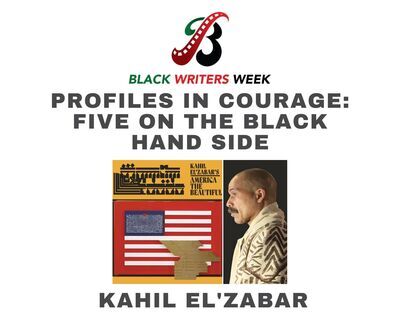Profiles in Courage: Kahil El’Zabar

Dr. Kahil El’Zabar, (PHD Interdisciplinary Arts from Lake Forest College, 2006), has been performing professionally, as a creative musician (multi-percussionist), since the late 60’s. He first went on the road with the legendary Gene Ammons, and later throughout his career with such luminaries as ,Dizzy Gillespie, Pharoah Sanders, Stevie Wonder, Lester Bowie, Nina Simone, Archie Shepp, Eddie Harris, David Murray, Donny Hathaway, Malachi Favors, Kurt Elling, Neneh Cherry, and on.
El’Zabar joined the legendary AACM (association for the advancement of creative musicians) in 1970, and later became chairman(1975-82). He is leader and founder of the internationally renowned Ethnic Heritage Ensemble and the Ritual Trio, and has recorded more than 60 acclaimed projects worldwide. He has won numerous awards over the years for his musical skills, from Down Beat and Jazz Is magazines, as well as the Jazz Journalist Association. Sir E’Zabar was actually Knighted by the French Government in 2014, (Chevalier Medal of Letters) for his impactful contribution to the arts internationally. He was named Chicagoan of the year in 2006 by the Chicago Tribune. He has been an artist in residence since 2008 in the City of Bordeaux, France, where he has created, organized, and produced a myriad of stellar performance and exhibition projects. Sir Kahil El’Zabar is considered by his peers, as well as filmmaker George Lucas, to be one of the most innovative and influential musicians of his generation.
Dr. El’Zabar has been an associate professor at the U. Arizona, Tucson, U. Nebraska, Lincoln, and U. IL. Chicago. He has sat on the advisory boards of the National Endowment of the Arts, and the Lila Wallace Readers Digest Fund. He was appointed by President Bill Clinton, to the National Taskforce on Arts Presenting in Education, and is a founding member and board of director for the National Campaign for Freedom of Expression. He created as well as curated “Traffic,” an interdisciplinary arts performance series for Steppenwolf Theater. Kahil has scored music for such box office hit films as “Mo Money” (Columbia Pictures), “Love Jones” (New Line Cinema), “How U Like Me Now” (Universal), and “America the Beautiful” (Warner Bros.). He has also scored musical arrangements for the theatrical version of “The Lion King” (Disney). Sir El’Zabar is currently signed to Spiritmuse Records (London), and is also co-producing Spirit Gathering, an internationally curated interdisciplinary festival of the Arts. El’Zabar is the conceptual director and founder of OOHnow, an online culture/network of the who’s who in the Arts.
According to his official site, El’Zabar “produces healing music for the soul that promotes wellness and spiritual empowerment.” In 2017, filmmaker Dwayne Johnson-Cochran released the documentary, “Be Known – The Mystery of Kahil El’Zabar,” which chronicles the 2007 Black History Month tour embarked upon by the musician and his band (the trailer is embedded below).
His latest album, released last year, “America the Beautiful,” was praised by Pitchfork‘s Marty Sartini Garner as a “moving, frequently ebullient album that doesn’t shy away from the terrors of America’s past and present while managing, somewhat incredibly, to find hope in the country’s future.” In his review, Garner writes, “At times it feels like an argument for Black culture as both a consistent force in this country and a rebuke to the chaotic excesses of white supremacy’s most demonstrative displays of power. If we understand the word ‘politics’ to mean the way we organize our mutual action, this is explicitly political music: ‘Now’s the time for us to collectively invoke a confluence of trust and imagination that will enlighten a future path towards ethical humanity,’ El’Zabar writes in the album’s statement of purpose. It seems strange, in the waning months of 2020, to hear someone express hope for our country’s future—to suggest that anything like ‘ethical humanity’ is still possible on a societal level. But then again, Americans have been guiding their country toward the light since the days of its broken birth. Most just weren’t called ‘American’ at the time.”





